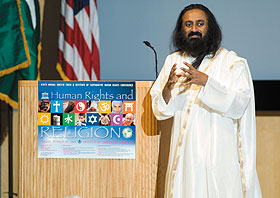  |
| HOME | THIS ISSUE | CALENDAR | GRANTS | BACK ISSUES | < BACK | NEXT > |
Combine spiritual values with political activism, conference presenter urgesby Gregory Hladky - October 27, 2008
|
||||
| Breath control and meditation can be part of the solution for a world in economic and political turmoil, according to spiritual leader Sri Sri Ravi Shankar. “The root cause of violence is stress and a lack of understanding,” he told an audience of more than 350 people at the Student Union Theatre on Oct. 21. His prescription for solving those problems is an unusual combination of ancient Indian traditions, modern education, and new attitudes toward religion, business, and politics. Shankar (no relation to the musician) was the closing speaker at a conference on the extent to which values molded by religious institutions and philosophy have promoted or undermined human rights. The daylong event was sponsored by the UNESCO Chair & Institute of Comparative Human Rights in the College of Liberal Arts & Sciences. Shankar is the founder of the Art of Living Foundation, an international nonprofit educational and humanitarian organization. His foundation has been involved in relief programs for natural disasters such as the tsunami in Southeast Asia and Hurricane Katrina, as well as mediation efforts in regional conflicts from Kosovo to Kashmir. Shankar has been recognized around the world for his work toward global peace. Other featured speakers at the conference were Archbishop Njongonkulu Ndungane, retired archbishop of Cape Town, South Africa, and Jeremy Gunn, director of the American Civil Liberties Union program on freedom of religion and belief. In his evening keynote speech, Shankar argued that all cultures “need to secularize religion.” He said one way to deal with religious intolerance is to have “people of every religion pray for the people of all religions.” Young people need “multi-cultural and multi-religious education,” he said, to help them understand that everyone is part of the worldwide human society. Shankar said there is an urgent need to “socialize business,” not through state takeovers of private industry, but by having every business recognize that it has “a social responsibility” to its workers and its customers. According to Shankar, the best solution doesn’t involve a choice between socialism and capitalism but “a good marriage of both.”
Shankar said he believes each nation must “spiritualize its politics … Today, spiritual values are being eroded from politics, and corruption is taking their place.” He pointed to Mahatma Gandhi and his combination of spirituality and political activism. At the heart of Shankar’s philosophy is his belief that people can reduce their own stress – and therefore the stress and violence in the world – through deceptively simple techniques, such as controlling their breathing. “Your breath is the link between mind and body,” he said. His belief is that the human mind and its emotions are often too intangible for a person to control. “But what you can have control over is your breath,” he said. “If you attend to your breath, you can calm your mind down.” Asked how he was able to get members of violent groups to listen to his message of peace, Shankar recounted his interaction with extremists in the disputed province of Kashmir, on the border between Pakistan and India. After several sessions of breath control and meditation, Shankar said, “their minds became calm” and they started to listen to his message of non-violence. “It was a shift,” he added, “even though it was just a drop in the ocean.” In discussing how to combat prejudice, Shankar urged the audience not to see the world only in terms of “culprits and victims.” “Inside every culprit there is a victim crying for help,” he said. He also argued that those seeking to right the world’s wrongs should not fall into “a victim consciousness.” “Fight for justice, but without being self-pitying,” Shankar said. “Mahatma Gandhi fought for his rights, but never did he hate the British.” |
| ADVANCE HOME |

